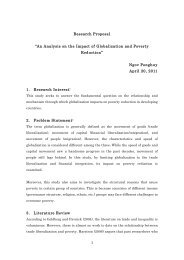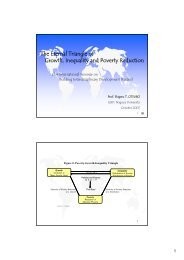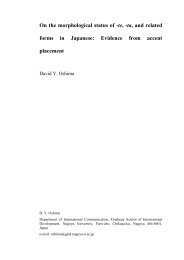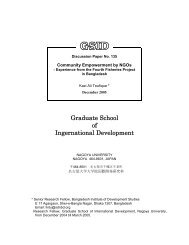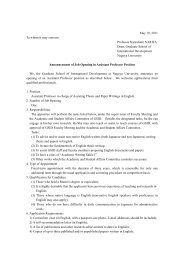Report
Report
Report
You also want an ePaper? Increase the reach of your titles
YUMPU automatically turns print PDFs into web optimized ePapers that Google loves.
T OURISM AND TRAVEL RELATED SERVICES 129<br />
the share of foreign ownership was about 13%.<br />
Tourism has substantial links to other sectors of<br />
the economy, such as construction, transportation,<br />
distribution, and telecommunications (Maldives’ TPR<br />
2002). New tourism legislation was introduced in 1999<br />
(Maldives Tourism Act No. 2/99). The government<br />
leases islands to investors for resort development; land<br />
cannot be sold for tourist activities. The new legislation<br />
increased the maximum lease period from 21 to 25<br />
years on investments below $10 million and retained<br />
the period of 35 years for larger amounts, but introduced<br />
a 50-year lease period under certain conditions.<br />
The company must be Maldivian registered and owned;<br />
have at least 50% of its shares publicly held, with no<br />
more than 1% held by a single shareholder (or 5% for<br />
an investment company); and have listed as its main<br />
purpose development and operation of tourist resorts<br />
in its Memorandum of Association.<br />
All non-Maldivian citizens (unless holding a resident<br />
permit) staying in registered tourist resorts, hotels,<br />
guesthouses, and tourist-accommodating vessels pay<br />
the bed tax (Maldives’ TPR 2002:50). Since it is a flat<br />
rate, the ad valorem incidence of the levy, which<br />
depends upon the room rate, falls more heavily on the<br />
cheapest resorts.<br />
Restrictions and challenges: The World Bank (2006)<br />
suggests that issues are emerging on the horizon and it<br />
is time for the growth strategy to be reviewed. It is a<br />
long haul destination, more than ten hours from<br />
originating markets with only one major airport, which<br />
is likely to be a severe constraint to market expansion.<br />
• Maldives has long relied on a public sector role<br />
limited to creating the environment for sound<br />
investment in tourism and managing the leasing<br />
process, with private sector companies bidding on<br />
individual islands. The decision to increase the<br />
speed of issuing new resort leases represents a<br />
fundamental change in Maldives’ policy of expanding<br />
the sector gradually. A number of current<br />
operators are known to be very concerned at this<br />
change in policy. As part of the proposed expansion,<br />
the government has decided to create a public<br />
enterprise that would hold leases at low, preferential<br />
rates in a number of islands, and sell these to new<br />
operators. It would also sell some shares to the<br />
Maldivians on the stock market. The concept is still<br />
evolving, but advantages it would have for the<br />
country are not clear.<br />
• According to an enterprise survey conducted in<br />
three major sectors – tourism, transport-logistics,<br />
and manufacturing – covering 148 enterprises<br />
seeking answer to the question – what are the most<br />
severe obstacles in the Maldives’ investment<br />
climate? – revealed that the first four major<br />
obstacles to all three sectors are (i) access to finance,<br />
(ii) the cost of finance; (iii) access to land; and<br />
(iv) skilled labour (World Bank 2006: ix).<br />
Interestingly, entrepreneurs in the tourism sector<br />
identified the relative significance of the lack of<br />
skilled labour as the third highest constraint on<br />
investment decisions. This clearly shows that the<br />
lack of skilled labour is one of the major obstacles<br />
to the tourism sector. Only 9% of employees in<br />
tourism in the Maldives have acquired a degree or<br />
higher-level qualifications.<br />
• Access to land has also been identified as a major<br />
obstacle. Given the traditional allocation of land<br />
by government at request, there is no proper land<br />
market in the Maldives. However, with the<br />
commencement of a development project at a place<br />
adjacent to the Male Capital Island, there is an<br />
emerging land market. The World Bank suggests<br />
that there is also a need for a paradigm shift for<br />
the government from being a provider to a<br />
facilitator and a regulator. The absence of a vibrant<br />
private land market aggravates the access-tofinance<br />
issue, especially since banks are still focused<br />
on collateral based lending rather than cash flows.<br />
In this regard, the World Bank suggests that the<br />
government should promote the establishment of<br />
a modern movable assets registry to encourage<br />
using such assets as collateral.<br />
Being a small island country, Maldives is overwhelmingly<br />
dependent on other countries for the supply<br />
of goods and services and as a result it has a relatively<br />
liberal trade regime. Foreign investors own hotels,<br />
resorts, restaurants, etc. There are quite a few hotels in<br />
the Maldives owned by Indian companies (The Indian<br />
Hotel Company 2007). The Taj Group of hotels is the<br />
most familiar Indian brand. The Maldives is also<br />
dependent on the foreign labour force particularly from<br />
India, Sri Lanka and Bangladesh.<br />
Efforts are being made to increase the availability<br />
of domestic credit for tourism, for example, by establishing<br />
a state leasing company and allowing leased<br />
resort islands to be mortgaged to finance tourism<br />
development (Maldives’ TPR 2002). The authorities<br />
are aiming to increase employment of Maldivians by<br />
strengthening training. The faculty of hospitality and







